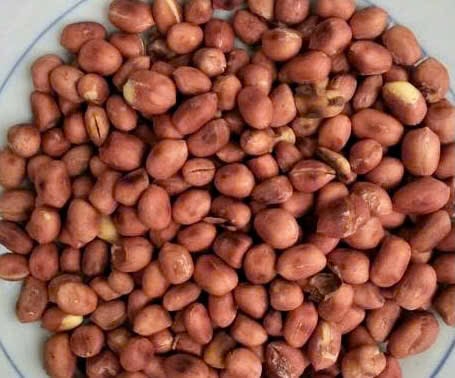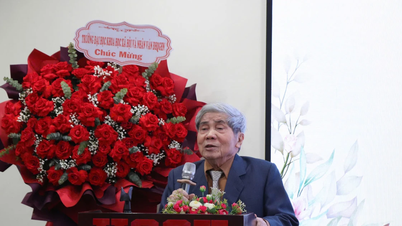Starting the day with health news , readers can also read more articles: Finding the culprit causing unexplained strokes in young people; Is it better to walk on an empty stomach or after a meal?; Discovering the amazing effects when you eat roasted peanuts every day...
Grapefruit: Unexpected benefits in helping you lose weight and lower blood pressure
Grapefruit is juicy and has a distinctive sweet and sour taste. Many studies have shown that grapefruit is rich in nutrients and bioactive compounds, which can support weight loss and regulate blood pressure.
One of the important components of grapefruit that helps with weight loss is fiber. Fiber plays a major role in creating a feeling of fullness, thereby helping to reduce the amount of food eaten. Therefore, the amount of calories taken into the body will be reduced.

Grapefruit contains many nutrients that support weight loss and improve blood pressure.
PHOTO: AI
Moreover, grapefruit is low in calories, making it a great choice for dieters. An average grapefruit weighs about 250-300 grams. The edible flesh of the grapefruit provides 80-100 calories. Therefore, grapefruit is an ideal choice for those who want to control their daily calorie intake.
Research published in the Journal of Medicinal Food found that people who ate 115 to 125 grams of grapefruit before meals lost more weight than those who didn’t. They also had improved insulin resistance. Scientists believe grapefruit may have a positive effect on metabolism, aiding in weight regulation.
Grapefruit is high in vitamin C. In fact, vitamin C is not only a vitamin but also a powerful antioxidant, helping to protect the body against oxidative stress and inflammation.
Vitamin C in grapefruit helps reduce inflammation and supports vascular endothelial function, thereby contributing to blood pressure control. The next content of this article will be on the health page on April 27.
Discover the amazing effects when you eat roasted peanuts every day
In a new study just published in the medical journal Antioxidants, Spanish scientists revealed a surprising effect from a popular dish: roasted peanuts.
Scientists at the University of Barcelona, in collaboration with experts at the Rovira i Virgili University and the International University of Catalunya, conducted a test to find out whether daily peanut consumption affects the aging process, through telomere length.

Snacking on roasted peanuts in the shell may help protect cell youthfulness
Photo: AI
Telomeres, the protective caps at the ends of chromosomes, get shorter with each cell division as we age. Therefore, a diet rich in antioxidants may help slow the rate of telomere loss.
Peanuts are a popular food source of several antioxidant compounds, including vitamin E, niacin, and polyphenols such as resveratrol. These compounds can neutralize reactive oxygen species and reduce inflammation, potentially preserving telomere length.
Researchers wanted to explore whether consuming antioxidant-rich peanuts could affect telomere length.
The study included 58 participants between the ages of 18 and 33, who were followed for over 6 months.
The results showed that after 6 months, the group that ate roasted peanuts had an increase in telomere length compared to the control group. This means that eating roasted peanuts with shells helps fight aging. The next content of this article will be on the health page on April 27 .
Is it better to walk on an empty stomach or after a meal?
Although it is a simple form of exercise, walking brings many health benefits. In addition, the time of walking, whether hungry or full, can also affect the benefits that this form of exercise brings.
Some recommend walking before breakfast to increase fat burning and improve mental clarity, while others choose to walk after meals to aid digestion and regulate blood sugar.

Walking on an empty or full stomach has many health benefits.
PHOTO: AI
The first thing to realize is that walking before or after meals is good for your health. Each type of walking has its own strengths. The important thing is that no matter which form of exercise you choose, you need to maintain a regular exercise routine.
Walking on an empty stomach, especially before breakfast, is often referred to as fasted cardio. The first benefit of this walking method is that it helps increase fat burning. The reason is that exercising on an empty stomach can help the body convert stored fat into energy for exercise.
Walking after a meal, on a full stomach, even for just a few minutes, can bring many benefits. The first positive effect is to help regulate blood sugar. A study in the journal Sports Medicine shows that walking gently after a meal will control blood sugar. Specifically, blood sugar in walkers will increase slowly and decrease gradually instead of increasing or decreasing suddenly. Start your day with health news to see more content of this article!
Source: https://thanhnien.vn/ngay-moi-voi-tin-tuc-suc-khoe-loai-trai-cay-quen-thuoc-giup-giam-can-huyet-ap-185250426233236444.htm



![[Photo] The Government Standing Committee works with ministries and branches on the real estate market situation.](https://vphoto.vietnam.vn/thumb/1200x675/vietnam/resource/IMAGE/2025/5/24/e9b5bc2313d14c9499b8c9b83226adba)


![[Photo] Ho Chi Minh City holds funeral for former President Tran Duc Luong](https://vphoto.vietnam.vn/thumb/1200x675/vietnam/resource/IMAGE/2025/5/24/9c1858ebd3d04170b6cef2e6bcb2019e)



















![[Photo] Party and State leaders visit former President Tran Duc Luong](https://vphoto.vietnam.vn/thumb/1200x675/vietnam/resource/IMAGE/2025/5/24/960db9b19102400e8df68d5a6caadcf6)


































































Comment (0)